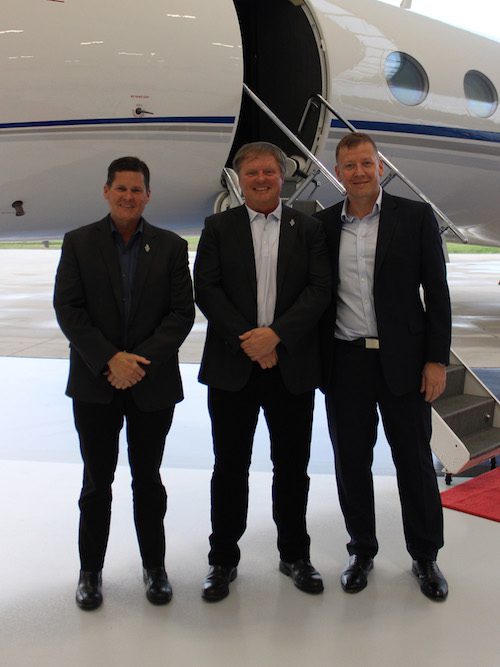
Left to Right: Satcom Direct’s John Kummer, VP Strategy & Programs, Jim Jensen Founder and CEO, and Chris Moore, President, celebrate STC approvals for the Plane Simple terminal on Gulfstream types. (Photo, courtesy of Satcom Direct)
Satcom Direct (SD), the Melbourne, Florida-based business aviation services company, has expanded the number of new connectivity technologies it is providing to Gulfstream to start 2022, including the launch of a new antenna system and becoming the default data link provider for new in-production Gulfstream jets.
Earlier this month, SD’s “Plane Simple” Ku-band tail-mounted antenna System achieved FAA Supplemental Type Certification (STC) approval for Gulfstream G550, G450, GV and GIV jets. The STC approval was followed by an an April 20 announcement confirming SD’s FlightDeck Freedom (FDF) flight deck communications platform as the default data link system on new and in-production Gulfstream G500, G600 and G650ER jets.
The first production line-fits for the models have already been completed, according to the company. Both achievements will expand SD’s ability to provide connectivity services as well as new flight operations and passenger experience applications for Gulfstream operators.
Under a collaboration with Bobingen, Germany-based aircraft modification and certification services company, the Plane Simple antenna system has also received certification approval from the European Aviation Safety Agency, (EASA) for multiple Bombardier types, covering Global 6000, 5000, Express XRS and Express jets.
SD’s new certification achievements for the Plane Simple antenna system marked the end of several years of development of that system in partnership with QEST, Quantenelektronische Systeme GmbH, a company based in Holzgerlingen, Germany that makes antenna transmitting and receiving equipment.

The Plane Simple Ku-band tail mount antenna was confirmed qualified for Ku-band service activation by Intelsat in January. (Photo, courtesy of Satcom Direct)
During an interview with Avionics International in February upon achieving qualification of the new antenna system on Intelsat’s FlexExec network—a Ku-band satellite service that exclusively serves business aviation launched by Intelsat in 2018—Chris Moore, president of Satcom Direct said that the company developed the 12-inch tail-mounted antenna system with just two line-replaceable units for mid-to-large sized business jets with a range of 3,000 miles or more.
“The two LRUs are really important because the modem unit goes in the un pressurized vessel of the airframe. So it doesn’t take up any space within the aircraft’s baggage compartment where most of the current systems go today,” Moore said. “Most of the antenna systems available for business jets today have four to five LRUs and are variants of systems developed for airliners that have been aligned to business jets. We’re the first company that we know of that has developed an antenna system purposely designed for business jets.”
Moore said that an unnamed business aviation operator has already started flying with the antenna system using Intelsat’s FlexExec network. Enabled by Intelsat’s Epic high-throughput satellite (HTS) network, the service enables a 10-megabit-per-second connection to the aircraft, enough to enable simultaneous live-streaming on passenger and pilot devices.
SD has also integrated a cybersecurity module into its connectivity services that exists within its SD Pro software as a service platform. The module interfaces all internet traffic occurring over its various networks with its global data infrastructure where engineers constantly monitor the network for security risks.
Flight testing of more than 115 flight hours over 62 individual legs with 250 GB of data transmitted provided the qualification for the new system on an SD-owned Dassault Falcon 2000LX, according to a Jan. 24 press release about the new system.
According to Moore this is the first of a series of antennas that the company will launch.
“Plane Simple is our Ku-band system, however we’re also working on Ka-band variants, and we’re also working on an electronically steered phased array, or flat-panel antenna. Our focus is on developing an open architecture that gives operators that ability to make use of the best and most capable satellite networks that meet their respective operational profile requirements,” Moore said.
SD expects further certification approvals for the new antenna on other aircraft models by the end of the second quarter from the FAA and Transport Canada in addition to EASA.